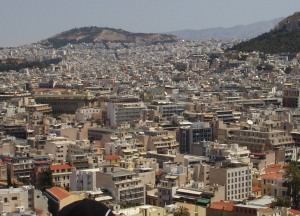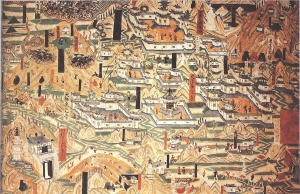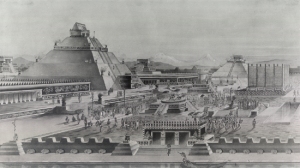Human civilization has made its own history through the tempests of culture and creation.
But with all of civilization’s benefits, humanity simultaneously cursed itself to permanent warfare. Warfare does not just exist on the battlefields with armies and weapons; it also functions inside the unjust and unequal distributions of class power within both society and culture. The warfare of urbanization has represented one of the most absurd attributes, whirling inside the tragic saga of the human condition.
Humans have left the sanctity of the land, the hearth, and the family, in order to transform themselves into subjects under the weary gaze of the rulers. The subjects receive a new identity, and yet they become targets for both the rulers and the enemies of the rulers. Wherever there are political rulers, there are always enemies. A minute faction from the subject population reaches into the ruling clique, while another minute faction joins the enemy camp.
Some human ideas have been beneficial to civilization, such as fire for culinary, metallic-sculpture and martial arts, and the wheel for transport, industry and the ceramic arts.
The human invention of urbanization helped deliver civilization to Homo sapiens sapiens. The urban subject no longer had the obligation to work inside the Earth and hunt for food. They could attend to their own private gardens and enjoy the bounty of culture found in the city.
But there was also a terrible price on their heads, and a nasty fear had piqued those very subjects. What if the rulers became tyrants and then decided to sacrifice their own subjects in order to hold on to their own power? What if the enemies of the rulers surrounded, starved out and sacked the city, enslaving everything away in chains – including the subjects private belongings, and even destroying completely people’s extended families?
One of Urbanism’s stage right onto human history represented the 6 century BCE. On the Gulf Coast of Mexico lived a great people, referred to later in history, as the people of the rubber, or the ‘Olmecs.’
The land was good. The warm, balmy climate offered an agricultural abundance, yet its tempests disciplined the cities. The winds could bite, and yet they spread their ethereal honey on the plants and maize. The rains sometimes drenched and drowned the unwary travelers. Plants still made love to the rain. The reeds were often harsh to touch, but they helped in maintaining the delicate balance. Everything drank from the earth’s sacred blood, and then it all cascaded deep into the rain’s sacred liquid pools.
In the Olmec world, an impressive city of stone had stood proud to the world, and it possessed a marvelous large pyramid of brown boulder rocks in the center. Around the pyramid were bulky grey temple structures and some thick quarry palaces for the ruler’s family, noble relations, and priests. The massive stone pyramid holding the dark glare, gave the subjects a sense of identity, and it seemed that the calendar rituals and religious festivals truly connected to the earth world at both the cave level and sky worlds.
Sacrificial bloodletting enabled the elites to perform the magic effortlessly. All subjects possessed their blood lines to the city’s elites, whether through artisan, merchant or farmer relations. Their blood ties also ran deep into three distinct categories: territory, family and service-labor obligations.
Everybody had their own economic niche and knew their place within the city. There were no vagabonds or beggars, and no one starved on the streets. There weren’t any issues with festering garbage refuse, nor with rampant disease. The city was actually quite small compared to modern standards. It only had a few thousand residents. But each resident existed as part of a grander family, and an even larger kinship group. Everyone recognized his or her own sacred hearth and home within the great urban polity. The Olmecs were living in an almost paradise.
Yet, the urban polity felt unsettled about the constant warfare, the enemies that led sudden attacks, or even the unknown wrath of natural disasters, such as storms, quakes and floods. Like all things in the cosmos, the times began to change, with war and disaster occurring more frequently and more devastatingly. What was actually changing, if the same rituals of sacrifice and devotions had always stayed the same?
The elite families could change the rules for obligatory labor services and tribute taxes. With the continual wars, they often did demand more from the subjects. Living in a great city was a divine gift, but at the same time, the subject lived in dread of the elites’ magical and violent powers. What if the wars led directly to them? What if the city had actually defeated the enemies, yet the enemies had already destroyed all the family and kin ties?
Better to live free and easy than under the tutelage of a powerful, military dynasty – even with all of the blood ties. The subjects slowly began to leave the cities. They preferred to farm out in the mountains, near the water sources, runs, and forest clearings. Eventually, more people began to leave the city for the basic freedom found in the abundant Earth. About two hundred and fifty years later, after so many more years of warfare and emigration, the magical and powerful city stood abandoned.
The ancient city had its days in the light of civilization, and even the ancient Olmec elites knew that their cities would die in the distant future – just like the old dynasties and the old, decrepit great grandfathers.
Our modern cities are vastly different however. These blights on humanity refuse to die and the political-economic elites that run such cities have used every conceivable criminal trick within the shadowy schemas of history to continue their misrule. Our modern monsters want their hells to live forever in order to burn and flay the ignorant and poor masses. And like always, they seem to get away with their horrifying games of corruption.
Our modern cities have become suffocating nightmares representing the perversions of global monopoly capitalism strangled with rampant state consolidation, street level criminality, institutional corruption, and city hall tyranny. Meanwhile, the urban subjects have to shame themselves continuously in watching the slow dying of the homeless, while enduring the public signs that threaten fines and imprisonment with those public, intrusive billboards that advertise useless crap.
Within the chasm of modern urbanism, most of us must deal with street hustling and the brutality of open poverty. Most terribly, the rulers constantly threaten their own citizens in demanding regular payments for all of this madness. The subjects must submit to unending and augmenting protection monies through rent paying, housing frauds, bad public transit, utility extortions, municipal and sales taxes, street fines, parking fees and wage slavery.
Meanwhile, the urban masses endure the miseries of contaminated dirt, household pests, rude behaviors, flim flam artists, common insults and reckless property pimping. The three wild animals that tend to survive in these environments are rats, cockroaches and pigeons. That our modern, urban populations do not end up as crazed lunatics on the streets, explains the marvelous surviving power of the human will under civilization.
Some crap historians have stated that this urban system of decay has always existed within human civilization. This is another abject and hideous lie. The Greek polis had only few thousand actual citizens. Ancient citizens fully participated in the life of the polis, whether at war, peace, festivals or simply speaking truth to power in the public markets and plazas. No citizen had to live a marginalized existence. Those cities were more like medieval monasteries without all the rules, controls, living in cells, and hiding away from the public. The Greek polis lived as a tight community of citizen-warriors-pleaders engaged in the full plenary of an urban, spiritual life.
The imperial Roman city had changed greatly since the days of Peloponnesian Wars in the Hellenic peninsula, (during the fifth century BCE), but the spirit of the polis still survived – and even as ancient imperial Rome, (around the second century AD), had reached a population level of few hundred thousand.
Urban Romans generally lived in two types of housing, either in the ‘domus,’ or a type of round-square urban house with a garden and front patio, or in ‘insulae,’ which were small apartments in block buildings. These homes had no glass windows and anyone could enter the domus patios and the insulae apartments. The Romans had little need for privacy because the Roman state did not imprison and murder their own citizens over personal conduct. People lived in the public realm because the honor of the community was more important for social cohesion.
The insulae dwellers did not pay our contemporary rent extortions as some historians have stated; instead, the residents of the insulae paid for their housing through labor or service obligations, within the personal political economy where the lesser clients worked for their wealthier patrons. Roman insulae dwellers received a regular dole of bread and some other foodstuffs for basic survival. No Roman complained about such a dole because an urban resident received the basic rights for survival and community support.
All Roman citizens could take part in the political and public life of the market, or the ‘forum.’ Citizens had the right to use the public baths and bathrooms of the cities, called, ‘latrinae.’ All citizens gathered their drinking water, cleaning water and community news at the public fountains. Roman public life also frequented the market stalls where each city street had a particular artisan craft on display, called ‘tabernae.’
Roman elites also built their far off cities, called ‘colonae,’ for a specific population size, and all urban citizens, whether soldier or artisan, possessed full inclusion within the greater urban life. Romanization was not just an arrogant Caesar conquering a territory, it also represented an inclusive, small city for all nations that desiring to live the Roman, urban, imperial dream.
How did our modern cities become the horrors of horrors that they are today? We can thank European imperialism and mercantile capitalism, with their invasions, prisons, epidemics, colonialism, slavery and mass murder, around the middle of the sixteenth-century, or the 1500s.
European Colonialism destroyed the ancient cities and the marvelous wonders around the world. It replaced them with the health horrors that still fester in our days. The European colonial invaders who hated washing and cleanliness wanted to infect the rest of the world with their own miseries. In that sense, they were successful.
The European colonial powers enforced mercantile capitalism through its brutal monopolies, massive land thefts, slave trading and export plantations that worked the kidnapped laborers to death. Mass kidnapping rings located off the coasts of West Africa could always replenish the exterminated labor pool.
European colonial statecraft set up the first prisons, Inquisitions, witch hunting tribunals, and other wondrous torture methods to scare the cowardly. European authorities imposed the first forced conversions in order to exterminate the native cultures. The European colonial city had thus transformed into cauldrons of sickness, disease and the bad death. And like all epidemics, they have spread out into the entire human world.
The European colonial elites further perverted modern urbanism through dividing the colonial city into racial caste and social class sections. There was one destitute section for the colonized victims and the other poor losers, where there was another nicer section, usually around the city center, for the colonial bureaucrats and military commanders, inclusive of wealthy slave traders and slave owners who owned their second homes.
We still see such eyesores today. We have our ghettos ransacked with no jobs or brutal jobs that pay badly, abandoned buildings, disease and rodent infestations, run down, street crime ridden sections of town, and next we have our gentrified, hipster zones where the easy job, six figure salary people enjoy clean, well-stocked supermarkets with eclectic cafe-bar-restaurants. The city’s government juntas don’t care about how many people move into their urban wastelands, which chew out their millions of victims. The more poor vermin that enter, the greater the slave wage, reserve army of labor population pool. These massive, megalopolis cities literally feed from the trough of criminal neglect.
Large cities that are also capital cities are even worse off than the megalopolis cities. A large population of the capital city essentially exists on state parasitism. These state spongers include paper pushing government bureaucrats, military, judicial, legislative managers, political executives, numerous guard-security-police forces, and other useless appendages, such as media hacks, corporate consultants and ideological front groups. They offer no useful skills to society whatsoever – except in maintaining the supremacy of central, state and municipal government power.
There is no hope in changing such blights on humanity and on the Earth. The smart losers become wiseguys, gangsters and street thugs, while the sad others have to either beg for the privilege of becoming a wage-rent paying slave, or the real unfortunates, sensitive others, just abandon all hope and wait to die horribly on the city streets. Suicide through urban neglect.
Many fall into the traps and permanent craters of modern, urban life. Some will die painfully from mental-physical illness, or they will become hopeless addicts partying on bad, cheap drugs. Some others just spend the rest of their days in the prison-gulag-concentration camp system. A few will make it as low-level, legal assassins for the state’s military institution. Eventually, poverty, war and misery will tear apart most of their fragile minds and bodies.
Living within our modern urban pits, the political-economic elites have continued their relentless war against us. We Anarchists know this truth and so we only have one option remaining: we must fight against such injustices through both our dignity and honor.
We can squat abandoned buildings. We could wheat paper and spray paint over their threatening signs, or we can set up spontaneous parties in the city streets. We might also set up free kitchens, guerrilla gardens, and feedings, or arrange a free, bartering market in a public park – or even occupy central city locations and make them our own domains.
We have only our personal wills to mental freedom – these gifts still remain with us.









